Personalized Cup Noodles at Momofuku Ando Instant Ramen Museum
Friday, October 20, 2017
On our second day in Osaka, my husband and I went to the Momofuku Ando Instant Ramen Museum (now called CUPNOODLES Museum Okada Ikeda). Since we are regular ramen eaters, it’s only apt that we discover its history, how instant ramen is made, and how we can take home our very own personalized cup noodles!
I must admit: instant ramen is a preserved food and therefore, it isn’t entirely healthy. However, eating instant ramen has been a part of our everyday life, especially if you live in a fast-paced environment. It’s one of the most affordable and best comfort foods in the world.
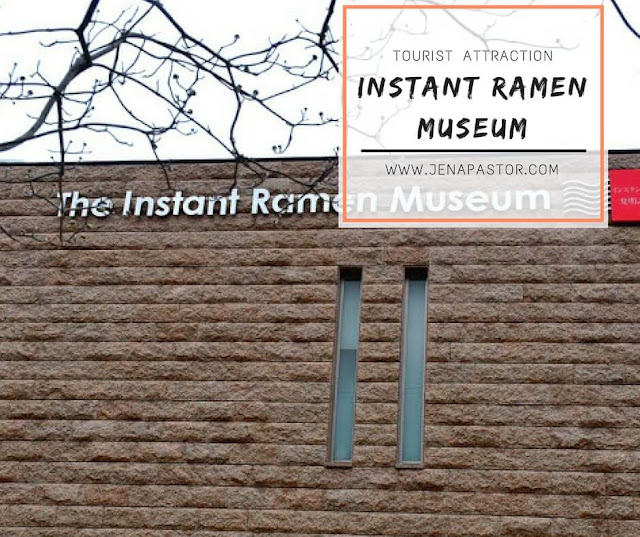
When I was away from home in college, instant ramen is my go-to snack. When I travel abroad outside of North and Southeast Asia, I bring 4 to 6 cups with me, especially on countries where I’m not familiar with their food. When I’m sick and have no appetite, I prefer to eat noodles over rice. Consuming instant ramen has its pros and cons, but sometimes you just can’t resist the umami goodness an instant noodle brings!
It took us 50 minutes to an hour from our hotel in Holiday Inn Osaka Namba to Momofuku Ando Instant Ramen Museum. From Ikeda train station, we walked about 10 minutes going to the building. Finding out the location was easy. Since we exited the station at around 11:00 AM, there were kids and adults who already had cup noodles hanging on their hands and necks, so we just followed the path where they came from.



Upon arriving at the museum, we were handed an English brochure. On the left side was the souvenir shop and on the right side was the entrance to the main exhibitions and attractions. Because my husband and I were too excited, we went straight to the CUPNOODLES Factory first. While the building looked quiet outside, it was loud inside the cup noodles factory (but in a good way).

Creating our customized and original cup noodle was so easy and fun! It felt like we were on a field trip! First, we queued to get our cups in the vending machine. Each cup costs ¥300 and only coins and a maximum of ¥1,000 bill were accepted. There’s a separate machine that exchanges high denomination bills just before the 3 cup vending machines. All cups were sealed to avoid contamination.

Second, we cleaned our hands in an automatic alcohol spray machine. We were asked how many we were in the group and another attendant lead us to a vacant table.


Third, we started drawing! Now this is the part where you can get very creative and design your cup however you want it. I saw some people who really took their time in personalizing their cups. Some were very artistic, while some people like me just grabbed whatever pen colors were available and doodled (Lol!).

Fourth, we went straight to the Cup Noodles Factory counter and handed our cup to one of the staff. They showed us a miniature version of how the noodles were being placed inside the upside down cup.



The 4 flavors are:
1. CUPNOODLES (which is the original Chicken flavor)
2. Seafood
3. Curry
4. Chili Tomato
(I’d stick to the original chicken flavor and seafood if I were you. And never commit the mistake of combining chili tomato flavor and cheese topping. It tasted awful.)
The 12 toppings are:
1. Shrimp
2. Cubic roast pork
3. Egg
4. Long green onions
5. Hiyoko-chan fish sausage
6. Garlic chip
7. Green bean
8. Cheese
9. Crab-flavored fish sausage
10. Corn
11. Kimchi
12. Pumpkin
Because we were there during spring, a Sakura topping was available instead of the pumpkin.

Sixth, the cup goes on to the sealing process which included adding the lid.


Lastly, we placed the cup into an “air package” and blew air into the plastic using a handheld pump. This protected the cup and allowed us to carry our cup noodles. However, we had the plastic protector removed when we packed the noodles inside our luggage.
Watch the entire cup noodle process here:
More photos inside the CUPNOODLE Factory:

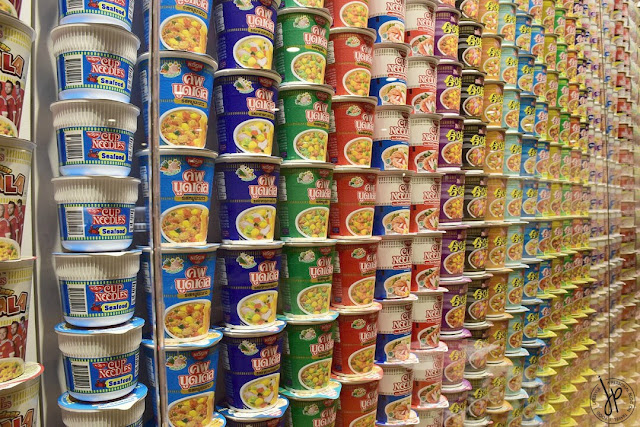 |
| The first column with Nissin Cup Noodles Seafood Flavor is the packaging in the Philippines. |
 |
| Global annual consumption of instant noodles per 100 million serving. Top 10 countries are: (1) China / Hong Kong - 404.3, (2) Indonesia - 132.0, (3) Japan - 55.4, (4) Vietnam - 48.0, (5) USA - 42.1, (6) Republic of Korea - 36.5, (7) Philippines - 34.8, (8) India - 32.6, (9) Thailand - 30.7, (10) Brazil - 22.8. Data estimated by World Instant Noodles Association (WINA) as of May 11, 2016 |



 |
| Nissin Cup Noodles for Japan Air Lines (JAL). Notice the same packaging for the instant ramen in front, but different taste. The left side is available in West Japan while the right side is distributed in East Japan. |
 |
| Momofuku Ando, 1910-2007. Successfully invented the first instant ramen at 61 years old. He lived a fulfilled life for 96 years. |

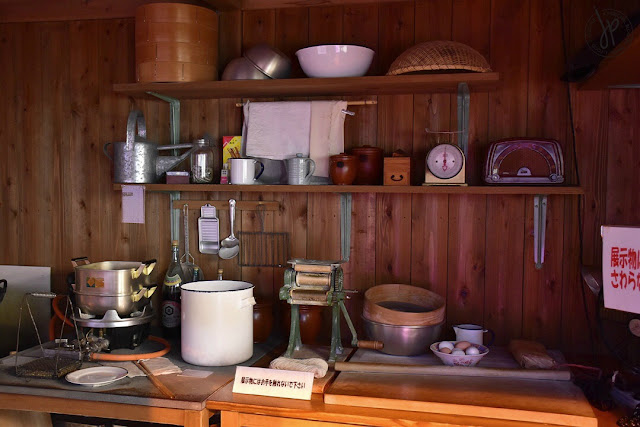
He started with only a small workstation that resembled a typical home kitchen. Because there was food shortage in Japan during post-war era in the late 1950’s, he developed the first instant noodles in a series of trial and error. His instant noodles became so popular locally and even abroad, that he was inspired to create a cup-noodle version so that these can be easily transported and eaten anytime. He also thought of packaging the said noodles with the cups upside down first so that the noodles are positioned directly into the cup’s form. The affordability and efficiency of this cup noodle idea sparked the wealth of Nissin.

 |
| On the left is Momofuku Ando's first creation, the original Chikin Ramen. On the right is Nissin's Eco-Cup, which is a reusable cup for instant noodles. |
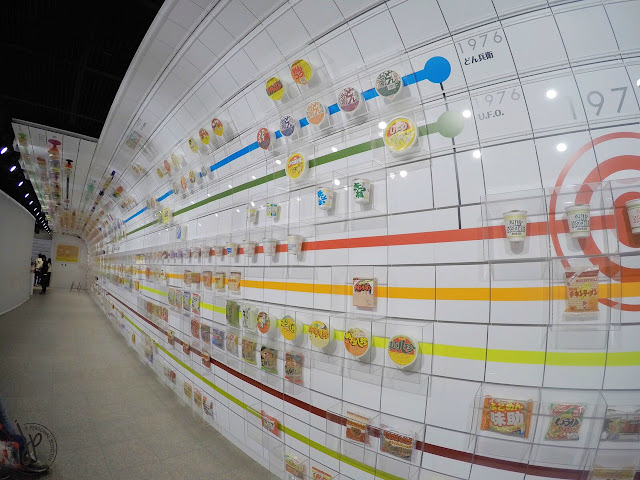
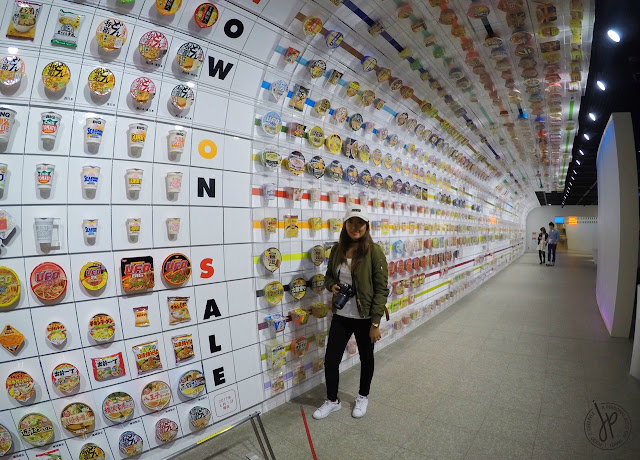
There’s also a wall that features a graphic, chronological history of Momofuku Ando and Nissin’s beginnings, as well as the company’s road to being a billion dollar business. Children can learn from the interactive walls and magical tables, however all the information are written in Japanese. The most interesting invention for me was the Space Ramen, an instant ramen produced for astronaut Soichi Noguchi on his trip aboard the Discovery space shuttle in 2005. Space Ramen was edible in space and can be cooked without the need of boiling water.

Momofuku Ando’s invention started with the intention of feeding his countrymen after World War II. Today his invention has become one of Japan’s national symbols and he is regarded as a hero for that. As you open that Nissin cup and pour hot water in it, this comfort food is no longer just a business innovation. More than that, it’s the outcome of ingenuity fuelled by the desire to help and the hope of breaking away from desperate times.

If you plan to visit the CUPNOODLES MUSEUM in the future, you may refer to these information:
Website: www.cupnoodles-museum.jp/en/osaka_ikeda/
Address: 8-25 Masumi-cho, Ikeda-shi, Osaka 563-0041 Japan
Telephone No.: 072-752-3484 (General information)
Museum Hours:9:30 – 16:00 (Last admission is at 15:30)
Closed: Tuesdays and year-end holidays from December 26 to January 2
Admission: Free
My CUPNOODLES Factory: ¥300 per cup
How to get to Momofuku Ando Instant Ramen Museum / CUPNOODLES MUSEUM by subway and train:
1. From your starting point in Osaka, get off at Umeda subway station.
2. Walk about 4 minutes and transfer to Umeda train station at Hankyu-Takarazuka Line (Hankyu Umeda Station). The journey is about 18-20 minutes.
3. Walk your way towards Masumi-cho Homen Exit. The street going to the Museum is at the right side of the road. There will be a road sign that directs you to the museum.
4. The walk from the train station to the museum is about 5-10 minutes. The museum is easily visible on the right side of the street.
Important Notes
1. Ticket machines on the Hankyu Umeda Station are only available in Japanese. There’s an English translation board in front of the machine, but it’s not noticeable at first.
2. Key in the amount you’re paying for instead of the name of the station. Fare is ¥270.
3. The museum is located in a residential area so it’s advisable to keep your voice down en route to the ramen museum.
Did you enjoy this post? Are you going to visit Momofuku Ando Instant Ramen Museum on your visit to Osaka? Share this post and plan your trip to Japan!
Disclaimer: This is not a sponsored post. The contents of this entry are purely my opinion and 100% honest based on my travel experience.

 |
| The Space Ramen or SPACE RAM. Flavors include Original (chicken flavor), Miso, Curry, and Tonkotsu. Requires 100ml of hot water. Cooked in 5 mins. |

If you plan to visit the CUPNOODLES MUSEUM in the future, you may refer to these information:
Website: www.cupnoodles-museum.jp/en/osaka_ikeda/
Address: 8-25 Masumi-cho, Ikeda-shi, Osaka 563-0041 Japan
Telephone No.: 072-752-3484 (General information)
Museum Hours:9:30 – 16:00 (Last admission is at 15:30)
Closed: Tuesdays and year-end holidays from December 26 to January 2
Admission: Free
My CUPNOODLES Factory: ¥300 per cup
How to get to Momofuku Ando Instant Ramen Museum / CUPNOODLES MUSEUM by subway and train:
1. From your starting point in Osaka, get off at Umeda subway station.
2. Walk about 4 minutes and transfer to Umeda train station at Hankyu-Takarazuka Line (Hankyu Umeda Station). The journey is about 18-20 minutes.
3. Walk your way towards Masumi-cho Homen Exit. The street going to the Museum is at the right side of the road. There will be a road sign that directs you to the museum.
4. The walk from the train station to the museum is about 5-10 minutes. The museum is easily visible on the right side of the street.
Important Notes
1. Ticket machines on the Hankyu Umeda Station are only available in Japanese. There’s an English translation board in front of the machine, but it’s not noticeable at first.
2. Key in the amount you’re paying for instead of the name of the station. Fare is ¥270.
3. The museum is located in a residential area so it’s advisable to keep your voice down en route to the ramen museum.
Did you enjoy this post? Are you going to visit Momofuku Ando Instant Ramen Museum on your visit to Osaka? Share this post and plan your trip to Japan!
Disclaimer: This is not a sponsored post. The contents of this entry are purely my opinion and 100% honest based on my travel experience.





0 comments